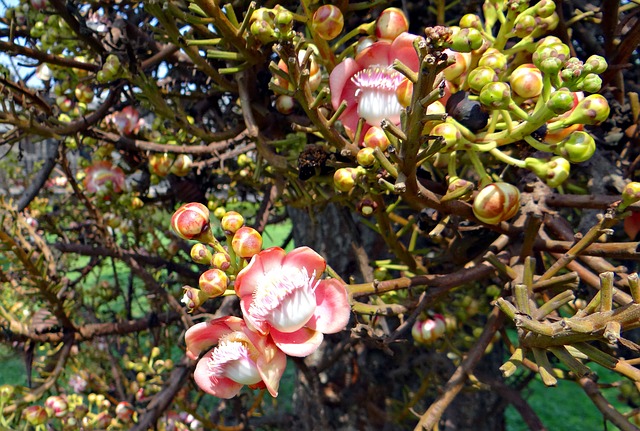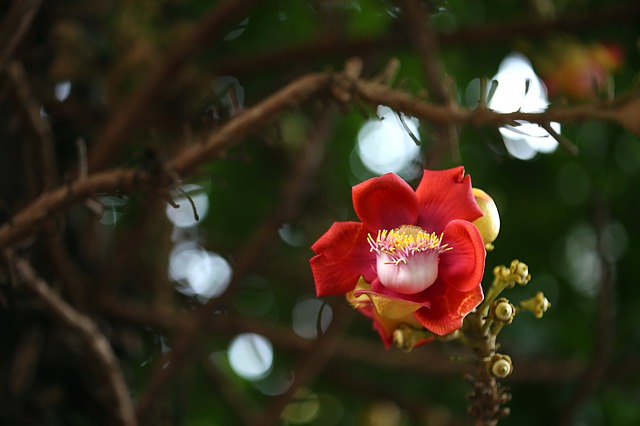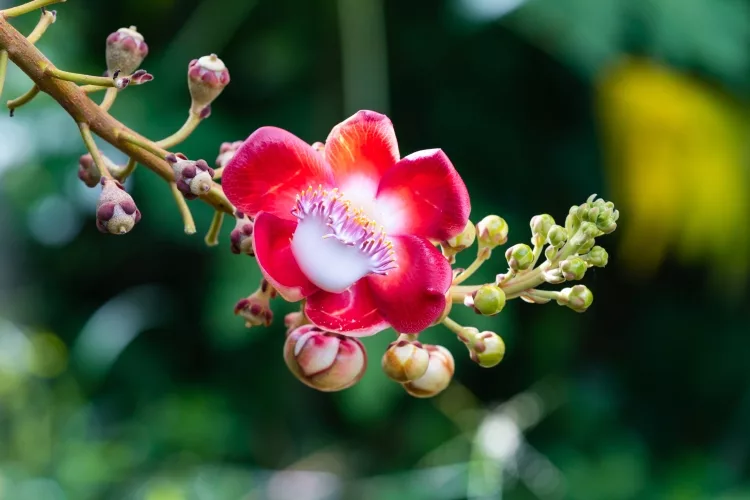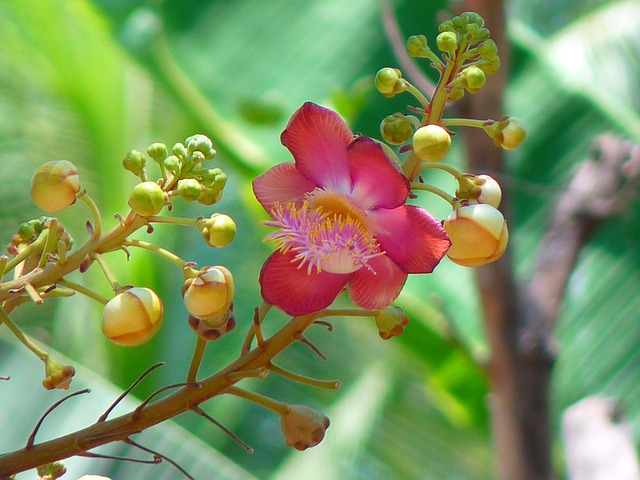reviewed by Christina Lopez
Nagalinga tree or Cannon Ball tree is treated as sacred in Hindu traditions. Naga means Snake in Sanskrit and Linga mean the idol of Hindu god, Lord Shiva. The petals of the flowers look like the Sacred snake Naga, and the hood looks like the linga protected by Naga, which is why the name was given according to the Hindu mythology.
Contents

The trees are mostly seen in Lord Shiva temples in India, and people believe that praying to Lord Shiva with Nagalinga flowers can to rinse off their sins. Either it's true or just an overrated tradition, why not give it a try? Lol, let's keep the traditional beliefs aside. We've got some actual and useful benefits. Read through the article:
Nagalinga Tree was given a botanical name Couroupita guianensis, by a famous botanist J.F Aublet in 1755. This tree can grow up to 35 meters tall and has solid trunks, stems which can bear up to 1000 flowers a day. Cannonball tree is mainly useful in many ayurvedic treatments. Let's see each of precisely.

Nagalinga flowers are round-shaped, colored in red, pink and yellow. They have a strong scent, and the smell can increase in the late nights and early mornings. Most of the flowers have six petals closing inside and looks like a snakehead. Here are some of the uses of Nagalinga Flowers:


Naga Linga tree produces a large number of fruits too, which exactly look like cannonballs used in wars, which is why the tree was given an alternative name of Cannonball tree. The fruits grow quite large and round. And make a considerable noise when they ripen and fall on the ground, bursting open. When they fall on the ground, they spread the scent which attracts the animals and bugs to eat.

Cannonball fruits have many Medical values too, to heal health issues. Let's understand what they are:
Nagalinga leaves look like any other regular tree leaves but used in many ayurvedic medicines. Here are some:
Even though the Nagalinga tree has many beneficial effects, it's recommended to take precautions while using them under the Ayurvedic professional. Sometimes the unripe fruits can cause allergic reactions and burning sensations in the mouth.
Cannonball can be used in daily activities and has several uses. Let's explore them too:
We've seen the amazing effects of the Nagalinga tree. Then I'm sure you would want it close to you. Let us tell you how you can grow it at your home.
These plants usually come with established roots in pots, which can be just moved your home directly. They don't require much special care and can be grown very quickly in both indoors and outdoors. Cannonball trees grow very fast and give fruits around in a year or two.
Cannonball requires the bigger sized pots to expand the roots bigger and reproduce. So, choose a pit of at least 24 inches wide and 20 inches height with enough drainage holes. Cannonball doesn't require a considerable water supply too. Soggy soil can result from the rotten roots. Drain the ground also before pouring in the pot. To maintain proper drainage, it's recommended to mix the soil with sand and perlite. Seeds can be directly sown and cover under a layer of soil without and pre-fertilization or treatment.
Cannonball grows better under maximum sunlight. It can bear up to 12 hours of sunshine in a day. But Cannonball is an indoor plant too. A spot close to a window with minimal exposure to sunlight. Watering the plant thrice a week is enough.
Under the above circumstances, the seeds germinate within 8 to 15 days. Make sure the seedlings are of 6 to 10 cm tall before you transplant in bigger containers or grow bags. They tend to take one year to blossom and give fruits.
Nagalinga tree has various names in various places, other than cannonball tree. Check them out:
There are many values hidden in the plants around us, but we tend to forget them and get into artificial treatments. However, Nagalinga Tree is truly a gem and adding the best to the world with its medical and mythological values. If not because of the traditional values, Nagalinga tree truly is sacred for its medicinal benefits.
Gulmohar Trees Complete Information
How to Grow Insulin Plant in your Garden?
Spiritual Importance of Brahma Kamal
 |
 |
 |
 |

About Christina Lopez
Christina Lopez grew up in the scenic city of Mountain View, California. For eighteen ascetic years, she refrained from eating meat until she discovered the exquisite delicacy of chicken thighs. Christina is a city finalist competitive pingpong player, an ocean diver, and an ex-pat in England and Japan. Currently, she is a computer science doctoral student. Christina writes late at night; most of her daytime is spent enchanting her magical herb garden.
 |
 |
 |
 |
Get new FREE Gifts. Or latest free growing e-books from our latest works.
Disable Ad block to reveal all the links. Once done, hit a button below
 |
 |
 |
 |